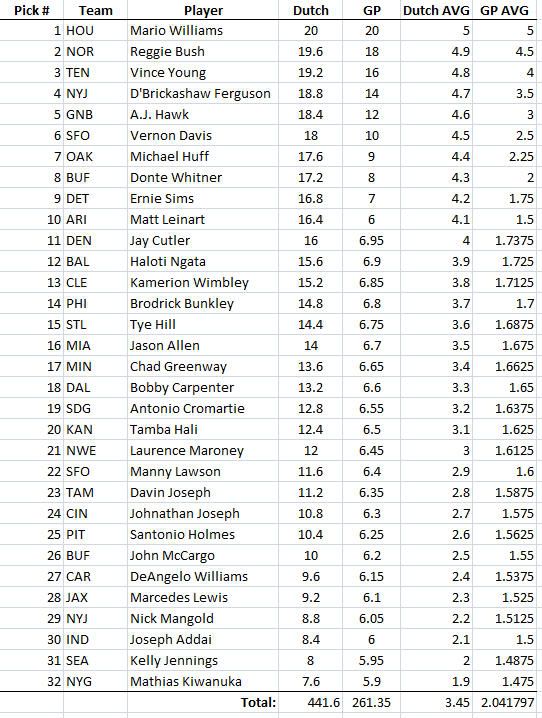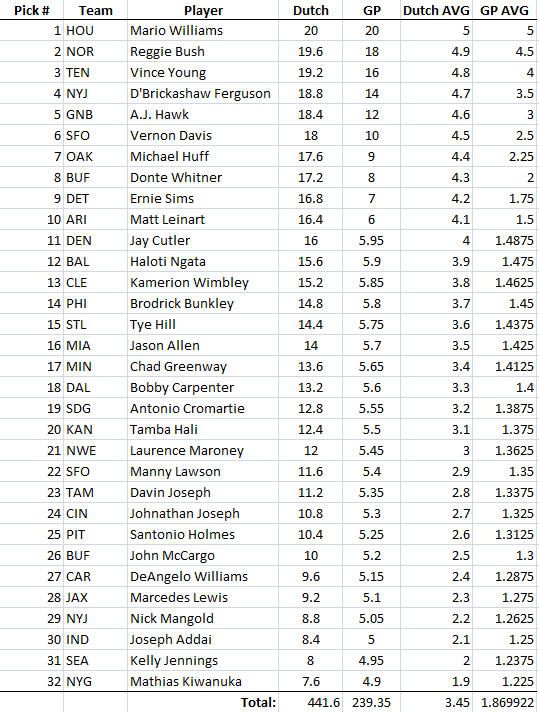NEW YORK -- NFL players and owners have agreed in principle to a new rookie wage system, sources on both sides told ESPN NFL Insider Adam Schefter.
There remains a handful of other issues that need to be worked out and talks are continuing, but the sources told Schefter the rookie wage system is no longer considered an impediment to a new collective bargaining agreement.
A management negotiator told ESPN senior NFL analyst Chris Mortensen that the rookie system is "done," but expected there to be some "tweaking" when the deal is written out. The exact language of the system is being worked out by both side's lawyer, sources told Mortensen.
Sources told Mortensen the two sides expect to work late into Thursday night and return Friday morning to work on open issues that include workman's compensation, extra right-of-first-refusals on this year's free agent class, settlement on the television damages and the antitrust lawsuit and issues relating to commercial sponsorships.
Additionally, the sources said owners want the NFL Players Association to recertify as a union and settle all grievances through arbitration without judicial oversight. To gain advantages on many of the remaining issues, sources say the players may be willing to grant the owners' request for a comprehensive arbitration system without judicial oversight, a thorn in the owners' side since 1993 on grievance cases that have been appealed to U.S. District Judge David Doty.
The players currently are unwilling to grant NFL teams extra right-of-first-refusals on this year's free agent class because many of them were restricted under last year's uncapped system. Owners have asked for the right to designate three free agents that would give teams the ability to match any contract the three players signed with another team.
Details for the rookie system are uncertain but multiple sources told ESPN.com senior NFL writer John Clayton earlier Wednesday that owners were willing to move toward the players' position regarding the fifth-year option in contracts of players selected top 10 overall, the sources said. The owners, sources said, offered to pay those players the top 10 salaries at their positions in their fifth year.
Players, however, rejected the owners' proposal to have the remaining first-round picks make 150 percent of what starters make at their positions with a possible salary floor of $4 million and a salary ceiling of $12 million, sources said.
High-level sources told Clayton all first rounders would get four-year deals, plus the option year, under current proposals. That option could be executed by the team after the third or fourth year of the contract.
Owners had been seeking a fixed amount for the fifth-year option, roughly $4 million. Players wanted a top 10 salary at the position for the top 16 picks and proposed a top 15 salary for picks 17 through 32.
During a lunch break Thursday, sources told Paolantonio the lawyers were working on some of the language and other details of a potential agreement.
It is not known what proposals brought each sides closer together on Thursday, but sides stretched into the evening for the second straight night.
NFL commissioner Roger Goodell and eight of the 10 members of the owners' labor committee were present at Thursday's session, including Jerry Jones of the Dallas Cowboys and John Mara of the New York Giants. Two new participants Thursday were Green Bay Packers CEO Mark Murphy and San Diego Chargers owner Dean Spanos.
NFL Players Association chief DeMaurice Smith and a half-dozen current or former players also were there, including Indianapolis Colts center Jeff Saturday, Baltimore Ravens defensive back Domonique Foxworth and Giants defensive end Osi Umenyiora. Umenyiora is one of 10 player plaintiffs in a federal antitrust lawsuit against the league.
Sources told ESPN's Mortensen that Atlanta Falcons offensive lineman Tyson Clabo, a pending free agent, also is in attendance.
After Wednesday's lengthy session, a source with direct knowledge of the negotiations told Paolantonio a lot of "hard work" remains before a new collective bargaining agreement can be struck. The source also wouldn't characterize a deal as being "close."
Asked whether he thought the owners would be presented with an agreement during the July 21 league meetings in Atlanta, the source hedged, saying, "I just don't know."
With deadlines coming up next week to get training camps and the preseason started, one owner told Paolantonio the owners are trying to figure out how to get the league operational in time "so that we don't lose a week of preseason and we don't lose $200 million."
The Hall of Fame game that opens the exhibition season is scheduled for Aug. 7 between the St. Louis Rams and Chicago Bears, who hope to be able to start training camp at the end of next week. Yet camps will not open without a new CBA in place.
Talks gained steam in May, overseen by a court-appointed mediator, U.S. Magistrate Judge Arthur Boylan, who is on vacation this week. Boylan ordered both sides to meet with him in Minneapolis next week, and the owners have a special meeting set for July 21, where they potentially could ratify a new deal -- if one is reached by then.
Even once an agreement in principle on the core economic issues is drawn up, there will be more work to be done. That's because there are certain issues that won't be addressed in full until after the NFLPA re-establishes itself as a union -- a process that might take a couple of days -- and can then serve once again as a collective bargaining unit for the players.
Items that could fall under that umbrella include the league's drug-testing program, health insurance, retired players' pensions and other benefits, none of which is likely to be resolved completely while the union is still dissolved.
There's also a chance the players could pursue a lockout injunction for rookies and free agents after an appeals court ruled last week that the work stoppage could continue.
Disruptions to the planned preseason schedule would decrease the overall revenue pie. While the parameters for how to divide the more than $9 billion in annual league revenues have been sketched out, there are other sticking points still under discussion, including a rookie salary system and free agency guidelines.
The owners want longer rookie contracts and have been seeking more right-of-first-refusal tags for unrestricted free agents. The players want to get back to free agency rules similar to 2009, when a four-year veteran whose contract expired was unrestricted. That minimum shifted to six years in 2010, when there was no salary cap because owners already had declared they were opting out of the old CBA.






